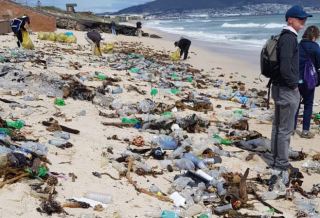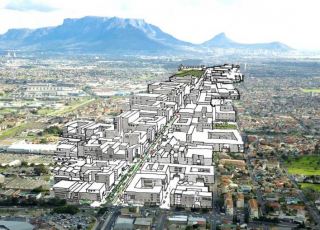Initiative to Capture Cape Town’s Trash Before it Hits the Coast
The City of Cape Town has joined key players and interested groups in the first of many meetings, to investigate ways to remove garbage from Cape Town’s rivers so it doesn’t make it into the ocean.
Included at the meeting were Plastics|SA, the South African Department of Environmental Affairs, Woolworths, The Percy Fitzpatrick Institute of African Ornithology, The Polyolefin Recycling Company (Polyco), Cape Town non-profit organisation Clean C, local digital marketing firm Gnu World Media and several other groups.
John Kieser, Sustainability Manager of Plastics|SA and facilitator at the meeting, says the main goal of this network will be to share information, ideas and resources for minimising the amount of litter that washes into the city’s seas.
Black River in Observatory is the first focus area. Already, Plastics|SA and the City of Cape Town’s Environmental Management Department have set up a system to remove litter floating on the river – 80 to 90% of which is plastic. A team gathers plastic at designated areas once or twice a week and takes it to Bokmakierie Primary School, where it’s separated and sent off for recycling.
In KwaZulu-Natal, the Department of Environmental Affairs is currently conducting similar projects, focusing on the Umgeni and three other rivers. If all goes to plan, the Department may consider funding similar Expanded Public Works Programme (EPWP) projects in Cape Town.
In the meantime, Kieser says the Cape Town network of groups will prevent people with the same vision – keeping our rivers and thus our oceans clean – from working in silos.
“It’s great that the plastics industry is facilitating this kind of dialogue,” says Gregory Player of NPO Clean C. With support from Cape Town-based digital marketing firm Gnu World, Clean C is working on a similar project – installing litter-catching nets over stormwater drains in the 4 kilometres between Sunset Beach and Milnerton Lagoon. Large amounts of household and general refuse – mostly plastic – washes into the lagoon from drains in areas including Joe Slovo, Sanddrift and Milnerton and then ends up on the beach and in the ocean.
The project would require a trained team of five to do regular clean-ups, and equipment like wheelie bins, uniforms, and a truck to transport the collected garbage.
Player says many EPWP projects run only in the short term and that most of the achieved improvements are lost once funding ends. “We’d like sponsorships to get the project off the ground – but once it’s implemented, we will move towards making it self-sustaining,” says Player.
Taryn Nightingale, PR and outreach specialist at Gnu World Media, says, “People forget that we form part of the same ecosystem the rivers, plants, oceans and animals do. We need to change how we view plastic and its value. When it’s recycled, there’s the opportunity to earn money from it, but when thrown away, it has grim consequences.
”Currently, only 5% of South Africans recycle. Mandy Naudé, CEO of Polyco, says the main reasons for this are a lack of education, incentive and infrastructure. “We must make it convenient for South Africans to recycle.” The organisation recently launched PACKA-CHING, which aims to increase recycling in informal settlements and lower-income areas. It has been running in Langa for about a year, and has resulted in the removal of about 240 000 kilograms of plastic since its inception.
Anyone interested in joining this network of plastic catchers or in helping in some way can contact John Kieser at This email address is being protected from spambots. You need JavaScript enabled to view it..
Cape Town’s Voortrekker Road Corridor regeneration project showcased at African Real Estate & Infrastructure Summit next week
Cape Town Summit to gather developers, investors and planners “
The Voortrekker Road Corridor offers a unique opportunity to invest in the urban core of Cape Town in one of its most important transit-oriented development corridors, taking advantage of the central location and extensive public transport infrastructure” – this is according to Councillor Johan van der Merwe, the City of Cape Town’s Mayoral Committee Member for Energy, Environmental and Spatial Planning. The City of Cape Town will present its Voortrekker Road Corridor: Strategy and Investment Plan at the upcoming African Real Estate & Infrastructure Summit at the Mother City’s CTICC from 2-3 November.
The presentation, which is open to industry professionals, forms part of an exciting line-up of high-level representatives from leading African cities, including Cape Town, Johannesburg, Nairobi, Dar es Salaam, Lusaka and Kampala, who will showcase the investment and development opportunities offered by their cities’ Urban Development Plans or specific major infrastructure projects. “
The City has spent in excess of R300-million on infrastructure investments” says Councillor van der Merwe, “which are directly serving the corridor and significantly more on bulk infrastructure that contributes towards the corridor. One of the key infrastructure investments that we are making is providing financing to PRASA to undertake a study to develop a plan of improvements/upgrades to this important rail corridor.”
He foresees the main challenges to be “urban management, which includes crime, grime and maintenance, which is a key issue within the corridor. Solving this challenge is key to attracting investors to the area. We see the solution to this challenge emanating from the continuation and further development of partnerships between the City, the Greater Tygerberg Partnership, city improvement districts, land owners, business operators, civic organisations and residents. In addition to this partnership approach, we are working with the City improvement districts and the Greater Tygerberg Partnership to provide additional services in key locations”.
African city of the future
More headline speakers at the African Real Estate & Infrastructure Summit that will also focus on key case studies of visionary city planning, investment opportunities in the commercial and residential real estate sector, the African city of the future and the challenges of urbanisation are:
- Tim Harris, CEO, WESGRO
- Jean Pierre Elong Mbassi, Secretary General, UCLG-A*
- Lord Mayor, Hon. Isaya Mwita Charles, Dar es Salaam
- Lekwalo Mosienyane, Director, Business Botswana
- Mokena Makeka, Founder & Principal, Makeka Design Lab, South Africa
- Kecia Rust, Director & Founder, Centre for Affordable Housing Finance in Africa / Secretariat to the African Union for Housing Finance, UN-Habitat, South Africa
- Amine Turki, Secretary General, Africa Union of Architects, Tunisia
- Professor Vanessa Watson, School of Architecture, Planning and Geomatics, University of Cape
*UCLG-A: United Cities and Local Governments of Africa
The African Real Estate & Infrastructure Summit will gather the full spectrum of the continent’s real estate sector and will assist African cities and governments to secure international investment for commercial real estate development and infrastructure projects that will contribute to Urban Development Plans (UDPs).
The African Real Estate & Infrastructure Summit is organised by Spintelligent, leading Cape Town-based trade exhibition and conference organiser, and the African office of Clarion Events Ltd, based in the UK. Spintelligent is well known for organising exhibitions and conferences across the continent in the infrastructure, energy, mining, agriculture and education sectors. Longstanding flagship events by Spintelligent include African Utility Week, East African Power Industry Convention (EAPIC), West African Power Industry Convention (WAPIC), Agritech Expo, DRC Mining Week and EduWeek.
UCLG Africa
The UCLG Africa is the patron of the upcoming African Real Estate & Infrastructure Summit in Cape Town. The UCLG AFRICA is the umbrella organisation and the united voice and representative of local government in Africa. It is an institution that gathers 40 national associations of local governments from all regions of Africa as well as the 2000 cities that have more than 100.000 inhabitants. Therefore UCLG AFRICA represents nearly 350 million Africans citizens.
Dates for African Real Estate & Infrastructure Summit 2016:
Showcase and conference: 2-3 November 2016
Opening session: 09h00, 2 November, 2016
Location: CTICC, Cape Town, South Africa
Website: http://www.african-real-estate-summit.com/
Twitter: https://twitter.com/ARES_Summit
Linkedin: https://www.linkedin.com/groups/8518271
Media contact: Senior communications manager: Annemarie Roodbol
Telephone: +27 21 700 3558 Mobile: +27 82 562 7844
Email: This email address is being protected from spambots. You need JavaScript enabled to view it.



